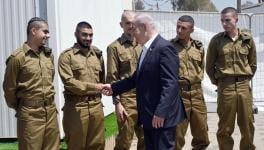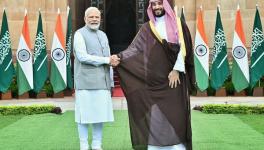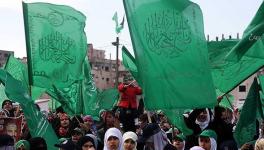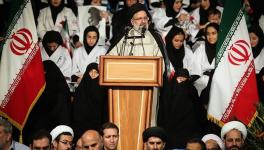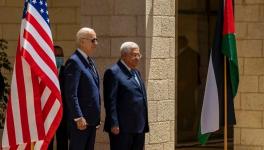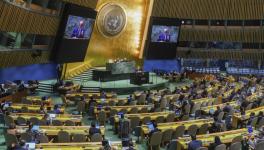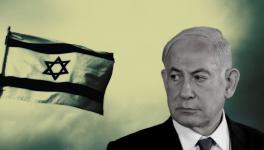Iran and Syria: Small Glimmer of Hope in a Bleak Scenario
As of now, the slide down in West Asia towards war – both on Iran and in Syria – seems to have come to a fragile halt. The negotiations in Istanbul on Iran's nuclear enrichment have not ended in mutual recriminations as was expected but in a promise to meet again in Baghdad in 6 weeks time. In Syria, the brittle peace engineered by Kofi Annan is mostly holding, al beit with some breaches.
Does this signal a change of course by the parties concerned, particularly the war block lead by the US, or is it mere manoeuvring to get Russia and China on board for the larger West Asia designs that the US has? This is a difficult question. But taking the last one year's events into account, this is the best chance we have for moving back from the brink, both in Iran and in Syria.
Iran and Nuclear Weapons
The Iran issue should have been a simple one. Legally, Iran has a right to uranium enrichment up to 20% – as long as the fissile material is under IAEA safeguards. This is what NPT guarantees. Iran has no obligation to give up uranium enrichment or technologies that can help in making a bomb. Such technologies are dual use technologies and giving up these technologies is equivalent to Iran giving up whole sectors of the economy. A course that is not asked of say, Germany and Japan. Probably about 40 countries in the world have the capability that Iran is being asked to give up.
IAEA under the current Director General Amano concedes that Iran's fissile material inventory is fully accounted for – Iran has not diverted any of it for weapons purpose. When IAEA talks about possible weapons technology, it is going beyond its legal mandate – which is to monitor fissile material and see that Iran does not manufacture a bomb. IAEA's foray into various other issues – bridge-wire detonators, bus sized container in Parchin, etc., are all playing to the US gallery and has little to do with its NPT mandate.
The issue for Israel and also the US has never been the actual violation of NPT by Iran. There is near unanimity that Iran has not renewed its weapons program after 2003. Developing weapons capability is allowed to it under NPT, as also building fuel enrichment facilities. Therefore, when Israel and echoing Israel, the US asks for dismantling its nuclear enrichment facilities and not building weapons capability, they are asking Iran to capitulate and give up what is permitted under NPT.
Not that there has been any agreement in Istanbul. That is going to happen –if at all -- only after some tough bargaining. The important point right now is the basis for the talks. West’s chief negotiator, EU foreign policy chief Catherine Ashton, at the conclusion of Saturday’s talks said, “We have agreed that the Non-Proliferation Treaty [NPT] forms a key basis for what must be serious engagement, to ensure all the obligations under the NPT are met by Iran while fully respecting Iran’s right to the peaceful use of nuclear energy.”. The key issue here is that the west now agrees that Iran talks will be held with NPT as its basis.
Israel has argued that a weapons capable Iran is an existential threat to it. The US has also been talking about various red-lines for Iran, some times actual nuclear weapons development, some times nuclear weapons capability. For both, the argument has been Iran should give up fuel enrichment. Therefore, if Ashton's statement is taken as the basis, this is a significant change. Not surprisingly, Netanyahu has criticised the talks in Istanbul, claiming that Iran is being given a “freebie”. Israel wants ratcheting up of the sanctions and driving the US into a war with Iran. This was proceeding quite nicely with brutal sanctions including cutting off Iran from the global banking network, with threats of more to come. What may have given the US pause is the realisation that turning Iran's oil spigot off will do far more damage than the current increase of 25 cents per gallon. With Russia, China and even India now not willing to hurt their own economy to please the US, the sanction route was hitting a huge road block.
Coupled with this, is the US now being caught in the Afghan quagmire. If they have to get out, and get out they have to given that the Afghan war is running out of steam, they need Iran. Just as they need Iran not to stir the cauldron in Iraq. The US does see the need to curb Iran as a regional power, but it also needs Iran to get out of Iraq and Afghanistan.
It is Israel which has the sole agenda of containing Iran. Israel knows that Iran acquiring nuclear weapons capability is going to weaken its position as the pre-eminent military power in West Asia and North Africa. Israel's claim that Iran with a nuclear weapons capability will become an existential threat to Israel with its arsenal of 300-400 nuclear weapons, is absurd. What Israel wants is that the US should take out Iran, as it took out Iraq. This will let it militarily dominate the entire Middle East, invade any country when it wants and bomb whoever they feel like. A nuclear capable Iran threatens the impunity with which Israel acts militarily today.
Syria – part of the Iran-Israel-US Mix
For Israel and the US, Iran's influence is now spreading – Iraq, Syria, Lebanon and even Palestine is under its influence. Therefore knocking out Syria – either regime change or a civil war – serves the larger interests of Israel and the US in the region.
Syria has also drawn the other West Asian powers into its fray. The Saudis, the Gulf Emirates and Qatar are all aligning with rising Muslim Brotherhood as is Turkey. For them, either secular nationalism or radical Islamic nationalism of the Iranian kind are threats to their relationship with the US and the NATO. They are all a part of the neo-liberal consensus, as are the Muslim Brothers. While they differ on Israel with the US and NATO, on the issue of Iran and its radical influence, they are all united.
The monarchies in West Asia are in favour of arming the Syrian opposition, while the NATO is still hesitating. Saudis, the Gulf Council and Qatar have all talked about providing arms to the Syrian rebels. The Emir of Qatar made his preference clear on the Annan peace plan when he talked about a 3% chance of its succeeding. For the west, possibly the rag tag band that constitutes the opposition in Syria does not give too much confidence that they can be welded into a coherent opposition, as was done in Libya. And even here, the splintering of the Libyan opposition after the fall of Gaddafi and Libya's descent into anarchy might give them some pause.
At the moment, the opinion in the US and its NATO allies seems to be that if the Annan peace plan holds and the Assad regime pulls back its forces from the towns, the Syrian opposition can trigger massive protests, which will in due course pull down Assad. All that the west requires to do is to bottle up Assad's security forces with UN observers and keep up the international pressure. This could be a serious miscalculation. While Assad has lost a lot of legitimacy in the last 12-months, the opposition, at least the ones the West is backing, has lost even more. The minorities know that any regime change will bring the most extreme forces into power, with the fate of minorities being effectively sealed. For them, and many in the secular opposition, a negotiated path to reforms is preferable to a military confrontation.
The real question in Syria is how each side mobilises on the streets as Assad withdraws his forces. Assad has re-asserted control through brute force over most of the restive areas – Homs, Idlib, Hama, Dara'a, etc . He has kept his options open --if the opposition physically attacks civil authority or the sate structures, his forces have the right the right to retaliate.
How the armed groups – the Free Syrian Army – behave, is an open to question. Just days before the ceasefire, the Free Syrian Army had launched attacks on a Syrian Army border check-post from within Turkish territory; what international media calls as refugee camps across the Turkish border are in fact armed camps. Whether they will continue with such tactics, how Assad handles the demonstrations, what the opposition to Assad within the country who have opposed external military intervention does, all remain to be seen. But the Annan plan is all that now stands between civil war and possible peaceful reforms.
Many in the West want the Annan plan to fail. As do the Gulf monrachies. For them, all that matters is containing Iran, even if it means another bloody war and adding Syria to the list of failed states in the region. Iraq, Afghanistan and Libya are not enough. The people in the region desperately need peace. And so does the rest of the world. Another regional war, another country awash with guns, another round of blood-letting is the last thing that any of us want.
The Istanbul negotiations and the Syrian ceasefire are small glimmers of hope. In an otherwise bleak scenario.
Get the latest reports & analysis with people's perspective on Protests, movements & deep analytical videos, discussions of the current affairs in your Telegram app. Subscribe to NewsClick's Telegram channel & get Real-Time updates on stories, as they get published on our website.












